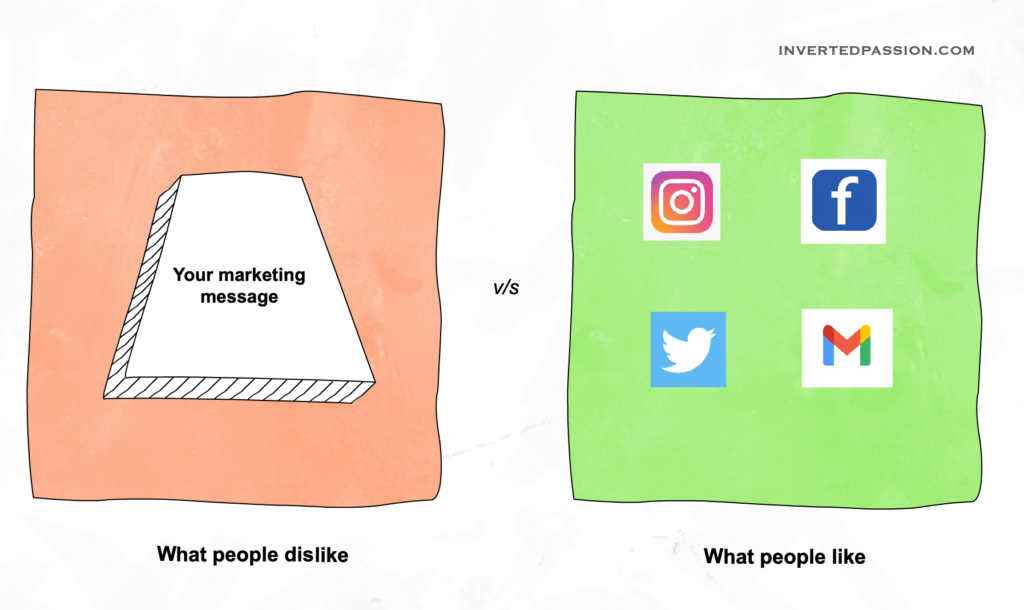You get pitched by other companies all the time. It’s estimated that we get to see thousands of ads every day. How many marketing messages from yesterday can you recall? If you’re like most people, it’ll be difficult for you to recall even a single message. At best, if you stress hard, you’d be able to recall only a few ones.

If you, the marketer or the entrepreneur, cannot recall ads or marketing messages you were exposed to, how do you expect your customers to do so?
Marketers spend a significant amount of time creating their campaigns, so they become biased into assuming that if their target customer sees the ad, she will remember it and take action whenever the need for the marketed product arises. But that’s not how customers’ minds work. They see an ad and move on with their life as if nothing happened.
That’s because all marketing messages compete for attention with however people want to spend their attention. If people want to focus on their work, a sales call is a distraction. If people want to spend time browsing Instagram, a TV ad in the background is a distraction. If people want to read articles in the newspaper, a banner ad is a distraction. And people automatically tune out distractions. They’ll not pick up phone calls from unknown numbers, switch off the TV or simply install ad blockers.
Because of this blindness to marketing messages, effective marketers take a more nuanced approach. While designing their marketing strategy, they focus their energies on three aspects:
- Motivation of the customer: in their marketing communications, they address upfront why should a prospective customer pay attention. And that ‘why’ is never about the product, it’s always about the person and her desires. Nobody wants to buy products. They want to satisfy one of their unmet desires. If a customer who receives a marketing message doesn’t relate to the ‘why’ of the ad or cannot easily find or understand such ‘why’, the ad becomes a distraction. That is why it’s important not just to articulate a clear reason for the prospective customer to pay attention, but also to avoid spending money on targeting people who don’t have that desire hoping that an ad will create such desire in them. Desire creation doesn’t happen that easily because an ad in itself doesn’t do anything. People forget the ads they see.
- Emotion evoked: people remember things that resonate with them emotionally. Marketing messages should hit the prospective customer on some emotional level – they should laugh, get surprised, or feel special. Unless they feel something, they will quickly forget that they ever saw or heard about something from your company.
- Repetition: one-shot marketing is worse than no marketing because it costs money without giving results. People forget things all the time. The only way to ensure that people remember that your product or service exists when they need it is to continuously refresh their memory about it. Yes, it’s expensive but that’s the only way it works. Effective marketers would rather reduce the number of people they reach but they ensure that they reach them again and again via multiple channels. It’s not the width of reach that matters, it’s the depth.
I call these 3 elements of marketing the MER framework (Motivation, Emotion, Repetition).
Remember that marketing isn’t about developing a message and reaching out to the target market. Most people consider marketing an intrusion into their lives. Effective marketing is all about crafting relevant, engaging messages that actually benefit and delight prospective customers and doing that repeatedly so that whenever the prospective customer feels a desire, she remembers your brand as the one that can fulfill her desire.
This essay is part of my book on mental models for startup founders.
Join 200k followers
Follow @paraschopra